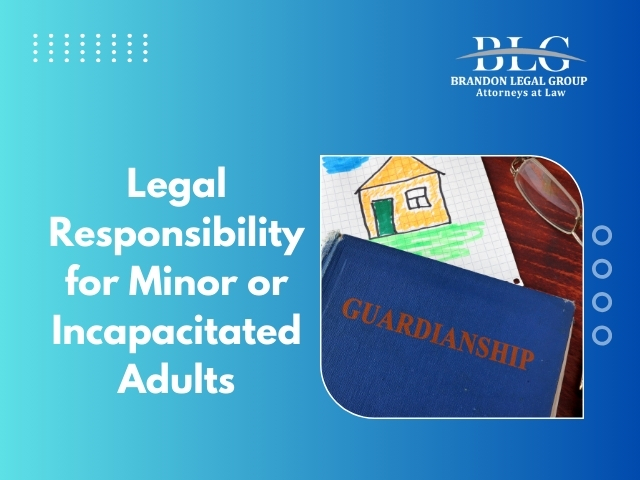Guardianship and Conservatorship
A guardianship involves a court appointing someone to care for another person and make decisions about their living arrangements if they are considered incapacitated. Conservatorship involves a court appointing someone to manage another person’s financial matters and assets if they cannot do so themselves. Reasons these may become necessary include caring for a minor child when parents die or become unable, or arranging care for an impaired adult.
When a Guardian/Conservator May Be Necessary
Caring for a Minor Child
Circumstances involving a child’s parents may prompt another person seeking legal guardian status, whether due to:
- Death of both parents
- Parental criminal activity and incarceration
- Mental illness, addiction or instability leading to removal/change of custody rights
If no parents are available or able to safely care for a child, guardianship grants another vetted, responsible adult the authority to provide for the child until age 18.
The following is a DRAMATIZATION AND IS NOT AN ACTUAL EVENT: For example, when Lucy’s parents were killed in an accident, her aunt petitioned the court to be appointed as Lucy’s guardian to provide care until Lucy turned 18.
Caring for an Incapacitated Adult
Various cognitive conditions can impair an adult’s ability to live and care for themselves independently – prompting guardian and conservator arrangements. Examples include:
- Debilitating neuro degenerative diseases like Alzheimer’s
- Severe developmental disabilities present since birth
- Catastrophic brain injuries causing loss of function
- Other disorders severely affecting memory, judgement and reasoning
Evaluating early signs that a person is losing capacity to make sound decisions can lead to conservative guardianship before an emergency. If an adult suffers severe cognitive impairment from dementia, developmental disabilities, brain injuries or other conditions that affect their ability to care for themselves, a guardianship allows another person to assume responsibility of care. Similarly, a conservatorship allows another to manage their finances.
The Guardianship/Conservatorship Process
Filing a Petition
The first step is filing a petition with the probate court in the county where the alleged incapacitated person lives. The petition can seek temporary and/or permanent guardianship/conservatorship and is typically filed by a family member or close friend.
Assessing the Person
The court investigates the physical/mental status claimed in the petition by appointing a court visitor to meet and examine the person, checking medical records and court records for other relevant information about their condition.
Establishing Guardianship/Conservatorship
A hearing is held so a judge can hear from witnesses and other relevant parties or relatives before officially appointing a qualified guardian and/or conservator. The guardian/conservator’s responsibilities are also formally defined by the court order.
Responsibilities as a Guardian and Conservator
Guardian Duties
As legally appointed guardian, your responsibilities are to arrange for the ward’s care, treatment, housing, education, recreation and more based on their best interests. You must periodically report to the court on the status of the ward under your care.
Conservator of Estate Responsibilities
Someone appointed conservator “of the estate” handles the conservatee’s finances and assets. Their oversight aims to fund the ward’s ongoing care and living needs fairly while preventing financial exploitation. Conservator powers typically cover:
- Managing Income, Assets, Property
- Paying Bills, Expenses, Taxes
- Making Appropriate Investments
- Preparing Court Accounting
- Selling Assets If Necessary
Conservators must file detailed inventories, budgets and transactions reports to the supervising court every 1-2 years.
Why Work with a Family Law Attorney?
The complex emotional and legal considerations involved in guardianship and conservatorship make working with an expert family law attorney essential. They assist clients by:
- Alleviating Burdensome Paperwork
- Ensuring Court Requirements are Met Appropriately
- Protecting Legal Rights and Best Interests of All
- Advising Filing Petitions Before Emergencies Occur
- Help determine least restrictive solutions balancing independence and protection
- Ensure your rights as petitioner or guardian/conservator
The Role of an Attorney Guiding Clients Seeking Guardianship
Each state may have different guidelines, and Florida’s statutes outline the specific regulations and procedures for appointing guardians for individuals who are unable to care for themselves due to age, incapacity, or other circumstances.
If you need help with guardianship or conservatorship issues, it’s a good idea to talk to a family law attorney who knows the laws in your area. They can explain things clearly and make sure you follow the right steps.
The following is a DRAMATIZATION AND IS NOT AN ACTUAL EVENT: We recently represented a client who became guardian for her grandson after her daughter passed away. We helped our client prepare her petition, assemble medical reports on her grandson’s special needs, and counsel her on guardian duties.
Conclusion
Caring for a child or impaired adult who cannot live independently often necessitates establishing a formal, court-approved guardianship or conservatorship. This allows another trusted person to assume care and decision-making while best protecting the rights and interests of the child or adult involved. With an experienced family law attorney assisting you, the complex process can be navigated smoothly and result in positive outcomes. Please reach out to arrange an initial consultation.
FAQs 
1. What are your legal fees to establish a guardianship?
Our legal fees range depending on the complexity of the case.
2. Can another state’s guardianship transfer to Florida?
Yes, with a formal petition process to officially transfer an out-of-state-established guardianship to have legal effect here. We can assist with handling the necessary filings.
3. Is a guardian allowed to compensate themselves from the conservatee’s money?
Yes, state law permits reasonable compensation for a private guardian/conservator’s time and expenses from the conservatee’s accounts. Accounts must still be filed with the court noting any compensation amounts paid.
Schedule a Consultation with Our Attorneys Today
Contact our office at (813) 902-3576 to arrange an initial consultation regarding a minor guardianship or adult conservatorship matter. Our attorneys have assisted numerous families address these complex situations and can provide trusted legal guidance for your case as well.
Call today – we are ready to help!
